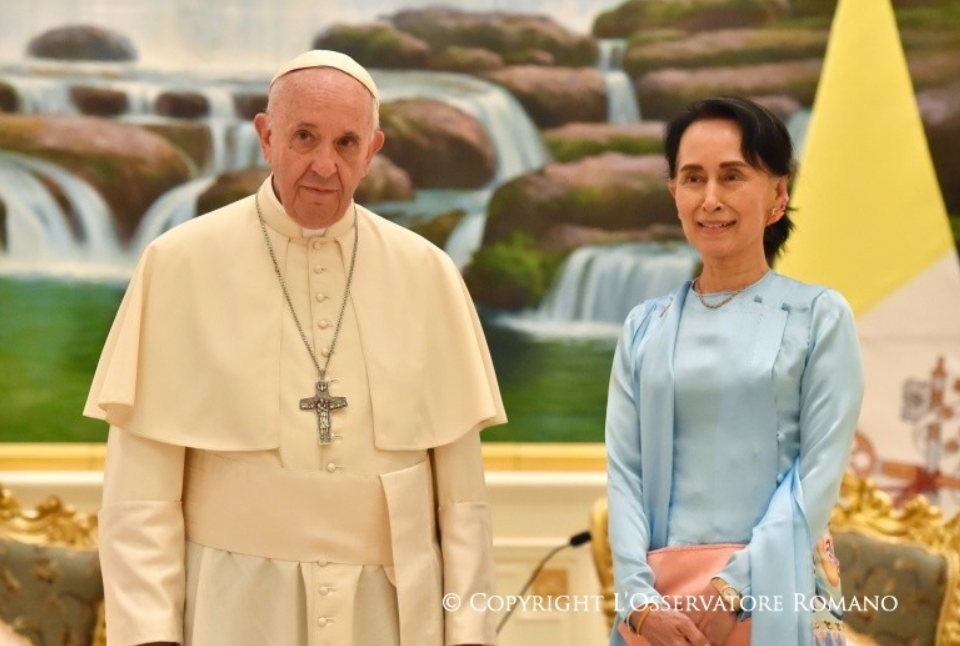Pope: ‘I asked for Aung San Suu Kyi's release by offering her hospitality in the Vatican’
In a conversation with Jesuits that took place in Jakarta and was published today by ‘La Civiltà Cattolica’, the pontiff - responding to a question from a Burmese confrere - recounted that he had asked for the release of the Nobel Peace Prize winner imprisoned in a location unknown to her own family. ‘In Myanmar today one cannot remain silent: the future of the country must be peace based on respect for a democratic order’.
Rome (AsiaNews) - Pope Francis has called for the release of Myanmar's democratic leader, Aung San Suu Kyi, who was arrested during the coup by the army in February 2021.
‘I called for the release of Mrs Aung San Suu Kyi and received her son in Rome. I offered the Vatican to receive her in our territory,’ the pontiff said during a conversation he had with Jesuit brethren in Jakarta, Indonesia, during his recent trip to Asia and Oceania and reported today by La civiltà cattolica.
‘I was in Myanmar and there I spoke with Mrs Aung San Suu Kyi, who was prime minister and is now in prison,’ the pope explained, referring to the trip made in December 2017, when the National League for Democracy was in power in the Southeast Asian country. ‘Then I went to visit Bangladesh, and there I met the Rohingya who were driven out,’ the pontiff continued further, speaking of the minority of the Islamic faith persecuted by the Burmese army.
Responding to a question from a brother from Myanmar who asked for advice on what to do after three years of civil conflict, Pope Francis admitted that ‘there is no universal answer to your question’, but reiterated the need for peace: ‘In Myanmar today you cannot remain silent: you must do something! The future of your country must be peace based on respect for the dignity and rights of all, on respect for a democratic order that allows everyone to make their contribution to the common good'.
The coup by the military junta put an end to a decade of democratic openings and started an internal conflict that, according to UN estimates, is claiming more and more civilian victims. According to the report of the UN High Commissioner for Human Rights, Volker Turk, between April 2023 and June 2024, killings increased by 50%. In the same period, at least 9,000 people were arrested and allegedly transferred to military training centres.
Aung San Suu Kyi, 79, Nobel Peace Prize winner in 1991, after 15 years in prison for opposing the military dictatorship, was first elected in the 2012 by-elections. Three years later, her party, the National League for Democracy, won a landslide victory in what are considered the country's first free elections. Having assumed the role of Councillor of State (she had been banned from being President), she began a series of democratic reforms.
The political situation precipitated in early 2021, when the military accused Aung San Suu Kyi of a series of fictitious crimes for which she faces up to 30 years in prison. Despite reports that she was placed under house arrest in April, her own family has no idea exactly where she is. Her current state of health is unknown, after she was prevented from having contact with the outside world, including her lawyers.
‘Right now the lady is a symbol. And political symbols are to be defended,’ the pontiff added, addressing the young Burmese Jesuit. ‘Do you remember that nun kneeling with her hands raised in front of the military? It went around the world. I pray for you young people, that you will be brave like that. The Church in your country is courageous’.







.png)










